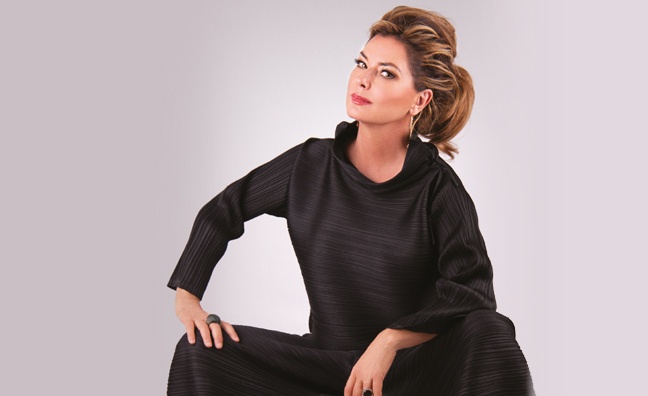Between hitting No.1 with her brilliant new album Queen Of Me, and charismatic appearances at the 2023 Grammy Awards and BRITs, we are seeing the full impact of the return of global superstar Shania Twain right now.
Last Friday – and arriving almost exactly 30 years after her eponymous debut, and 25 years after her first UK chart success, Come On Over – Queen Of Me debuted on consumption of 17,976 units.
In her recent Music Week cover story, in a wide-ranging interview, Twain reflected on the twists and turns of her career, while also taking in songwriting, body confidence, recognition of her legacy and her future plans (hint: a covers album may be in the offing).
One thing that has become abundantly clear is how Twain’s music has translated to subsequent generations – not only of fans, but also artists, with the likes of Harry Styles, Kelsea Ballerini and Taylor Swift all saluting her influence. Twain’s co-manager Leila Hebden of Maverick Management had her own thoughts on why this is.
“That's also the normal process of music when it's good,” she told music Week. “I’m not super-surprised that my kids love listening to, say, Yellow Submarine, because it's cross-generational. People are like, ‘God, it's so crazy that Shania's got such a young fan base.’ I'm like, ‘Not really – really popular, well-written music works in that way.’ Of course, kids love her music. My kids love her music."
If fans don't have the opportunity to discover music in a more organic way, what chance have you got as an artist?
Shania Twain
In an unread extract of our cover interview, Twain opened up about what the patronage of younger stars has meant to her, and also how it might have happened.
“It's a little bit like a rebirth in a way,” Twain said. “They were little kids when they heard my music for the first time. And at my shows, all those years ago, we set up a special queue with security just so the kids could approach the stage without their parents, because with parents, that would be too many people. So they let the kids go with security, I'd have long queues of them that would just come up to the stage. The Harry [Styles’] and the Jonas Brothers’ represent those kids that were in those lines. I feel like I'm living this all over again, just in the best way possible. It’s hilarious. When all these little, tiny kids that were coming to my shows, and having little pyjama parties with their friends to my music at, like, five years old, I was thinking, ‘This is like a daycare concert.’ I always just thought they'll never remember me [laughs]. Their parents have grown with me, but [I thought] the kids were gonna move on. So it's such a pleasant surprise that those kids grew up and now come back to the shows in their 20s. And they'll bring their parents now! It's so cute. I cannot tell you how adorable it is.”
In another unread extract of our cover story, Twain also told Music Week about the one thing she would like to see change in the music industry.
“It needs to be more democratic along the lines that people have to choose what they like, and what they don't like, and what they want to hear and what they want to see,” explained Twain. “We need a more direct response and connection to the people, to the fans. Because even on social media with what we do get – and I actually like the fact that we've got a more immediate exchange now – algorithms are getting in the way. Just as I was getting some faith, the algorithm culture is dictating so much. This is disturbing to me as an artist. If we feed everyone so much information, then they don't have the opportunity to discover in a more organic way. I'm a very liberal thinker in the sense of liberty, and freedom to discover. Like, as an artist, if you don't have that, what have you got? What chance have you got?”
Subscribers can read the full Shania Twain cover feature here.







